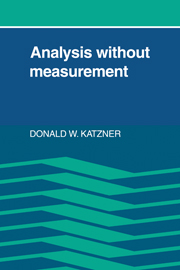Book contents
- Frontmatter
- Contents
- Preface
- Dedication
- 1 Introduction
- 2 Notes on measurement
- Part I Theoretical methods
- Part II Applications to theoretical problems
- Part III Empirical verification
- 12 Statistical background
- 13 Empirical relations among variables
- 14 An empirical application: occupational preferences and the quality of life
- 15 Getting on without measures
- Index
14 - An empirical application: occupational preferences and the quality of life
Published online by Cambridge University Press: 04 August 2010
- Frontmatter
- Contents
- Preface
- Dedication
- 1 Introduction
- 2 Notes on measurement
- Part I Theoretical methods
- Part II Applications to theoretical problems
- Part III Empirical verification
- 12 Statistical background
- 13 Empirical relations among variables
- 14 An empirical application: occupational preferences and the quality of life
- 15 Getting on without measures
- Index
Summary
Economists do not yet have a satisfactory understanding of the means by which individuals choose among occupations. Current theory (see, e.g., Friedman, Scitovsky, and Stigler) is largely based on two assumptions: First, by balancing both monetary and nonmonetary components, individuals arrive at a preference ordering of all possible alternatives. Second, they choose the maximal preference occupation from those not eliminated by relevant nonpreferential constraints. This is fine as far as it goes. However, what are the nonmonetary elements and how are they evaluated? According to Friedman and Kuznets, they include “such subjective and intangible factors as the prestige value attached to the profession, the opportunity it offers for rendering service and making ‘social contacts’, the conditions under which professional work is performed,…” One purpose of this chapter is to obtain a better understanding of these nonpecuniary factors.
The fact that substantial numbers of nonmonetary ingredients may influence the individual's choice of occupation suggests that the theory explaining how choices are made ought to be broadened. If it is to provide more than a superficial understanding of real situations, it has to account for the role these inputs play. Thus the theory should view occupational decisions as choices between distinctive life-styles or “qualities of life,” encompassing internal components such as pride and sense of achievement, as well as external factors such as physical working conditions and the type of people to be associated with.
- Type
- Chapter
- Information
- Analysis Without Measurement , pp. 275 - 290Publisher: Cambridge University PressPrint publication year: 1983



